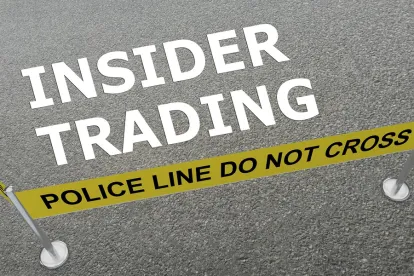On August 23, 2017, the United States Court of Appeals for the Second Circuit affirmed an insider trading conviction against a portfolio manager, and in doing so, held that the “meaningfully close personal relationship” requirement set forth in the Second Circuit’s landmark decision, United States v. Newman, to infer personal benefit “is no longer good law.”
Background
Matthew Martoma (“Martoma”) managed an investment portfolio at S.A.C. Capital Advisors, LLC (“SAC”) that focused on pharmaceutical and healthcare companies. His “conviction[] stem[s] from an insider trading scheme involving securities of two pharmaceutical companies, Elan Corporation, plc (“Elan”) and Wyeth, that were jointly developing an experimental drug called bapineuzumab to treat Alzheimer’s disease.” During the development of bapineuzumab, Martoma arranged for consultation visits paid by SAC with two doctors who were working on the clinical trial. One doctor was the chair of the safety monitoring committee for the clinical trial and provided Martoma with “confidential updates on the drug’s safety that he received during meetings on the safety monitoring committee.” The other doctor, a principal investigator on the clinical trial, provided Martoma with “information about the clinical trial, including information about his patients’ responses to the drug and the total number of participants in the study.”
In July 2008, one of these two doctors was selected to present the results of “Phase II” of the clinical trial at the International Conference on Alzheimer’s Disease, but prior to the conference, the doctor identified “‘two major weaknesses in the data that called into question the efficacy of the drug as compared to the placebo.” Martoma spoke with this doctor on two occasions, including an in-person meeting where the doctor shared with Martoma “the efficacy results and discussed the data with him in detail.” Martoma subsequently spoke with the owner of SAC and prior to the public announcement of the efficacy results, “SAC began to reduce its position in Elan and Wyeth securities by entering into short-sale and options trades that would be profitable if Elan’s and Wyeth’s stock fell.” When the final results from the clinical trial were publicly presented approximately a week later, Elan’s and Wyeth’s share prices declined and the “trades that Martoma and [SAC’s owner] made in advance of the announcement resulted in approximately $80.3 million in gains and $194.6 million in averted losses for SAC.”
The Appeal
In February 2014, following a four-week jury trial, Martoma was convicted of one count of conspiracy to commit securities fraud in violation of 18 U.S.C. § 371 and two counts of securities fraud in connection with an insider trading scheme. Martoma appealed his conviction primarily on two grounds—“that the evidence presented at trial was insufficient to support his conviction and that the district court did not properly instruct the jury in light of the Second Circuit’s decision in United States v. Newman, issued after Martoma was convicted.” Specifically, Martoma argued that there was no “meaningfully close personal relationship” as set forth in Newman between him and the doctor, and that the doctor did not receive any “‘objective, consequential . . . gain of a pecuniary or similarly valuable nature’ in exchange for providing Martoma with confidential information.” Martoma also argued that the jury instructions were inadequate because they “did not inform the jury about the limitations on ‘personal benefit’” as set forth in Newman.
The majority summarily rejected Martoma’s sufficiency of evidence argument finding that Martoma was a “frequent and lucrative client” of the doctor who was paid $1,000 for approximately 43 consulting sessions where the doctor regularly disclosed confidential information. Relying on Newman, the court noted that “‘the tipper’s gain need not be immediately pecuniary,’ and . . . that ‘enter[ing] into a relationship of quid pro quo with [a tippee], and therefore hav[ing] the opportunity to . . . yield future pecuniary gain,’ constituted a personal benefit giving rise to insider trading liability.” The court held that even though the doctor was not paid for the two consultations on the efficacy results, under the pecuniary quid pro quo theory, a “rational trier of fact could have found the essential elements of the crime [of insider trading] beyond a reasonable doubt.”
The crux of the decision lies in Martoma’s challenge to the adequacy of the lower court’s jury instruction. To complicate matters, during the pendency of the appeal, both the Second Circuit and the Supreme Court issued decisions that weighed heavily into the court’s analysis. First, in United States v. Newman, which we previously reported on here, the Second Circuit held, in relevant part, that a trier of fact could not infer that a tipper personally benefitted from disclosing information as a gift unless that gift was made to someone with whom the tipper had a “meaningfully close personal relationship.” This requirement was derived from an example the Supreme Court provided in Dirks v. S.E.C., 463 U.S. 646 (1983), where an insider is deemed to have personally benefited when disclosing inside information as “a gift . . . to a trading relative or friend.” Subsequently, in Salman v. United States, which we previously reported on here, the Supreme Court found as obvious that an insider personally benefits from trading on inside information and then giving the proceeds as a gift to his brother, and an insider “‘effectively achieve[s] the same result by disclosing the information to [the tippee], and allowing him to trade on it,’ because ‘giving a gift of [inside] information is the same thing as trading by the tipper followed by a gift of the proceeds.’”
Acknowledging that the discussion of gifts in both Dirks and Salman were “largely confine[d]” within the context of gifts to trading relatives and friends, and that the Supreme Court in Salman did not explicitly hold that gifts to anyone, including non-relatives and non-friends, can give rise to the personal benefit necessary to establish insider trading liability, the Second Circuit determined that “the straightforward logic of the gift-giving analysis in Dirks, strongly reaffirmed in Salman, is that a corporate insider personally benefits whenever he ‘disclos[es] inside information as a gift . . . with the expectation that [the recipient] would trade’ on the basis of such information or otherwise exploit it for his pecuniary gain.” Against this backdrop, the Second Circuit held that:
[A]n insider or tipper personally benefits from a disclosure of inside information whenever the information was disclosed “with the expectation that [the recipient] would trade on it,” and the “disclosure resemble[s] trading by the insider followed by a gift of the profits to the recipient,” whether or not there was a “meaningfully close personal relationship” between the tipper and tippee.
In other words, the Second Circuit “reject[ed], in light of Salman, the categorical rule that an insider can neverpersonally benefit from disclosing inside information as a gift without a ‘meaningfully close personal relationship.’” Coupled with the fact that it had already determined the evidence was sufficient to support Martoma’s conviction, the Second Circuit determined that the jury instruction pertaining to personal benefit was not obviously erroneous, and even if it were, such an error did not impair Martoma’s rights.
The Dissent
Of note in an already notable decision is the scathing dissent, which is lengthier than the majority opinion, authored by Judge Pooler. Judge Pooler opined that by expanding the recipient of a gift from a “trading relative or friend” as set forth in Dirks to any person, the “majority strips the long-standing personal benefit rule of its limiting power.” Judge Pooler expressed particular disagreement with the majority’s application of Salman to overturn Newman’s “meaningfully close personal relationship” requirement because the Supreme Court explicitly overturned the second holding in Newman that had required a showing of a monetary or other gain in conjunction with a gift of information to a trading relative or friend, but left untouched the first holding that there must be a “meaningfully close personal relationship” to infer a personal benefit from a gift. She states:
In the past, we have held that an insider receives a personal benefit from bestowing a “gift” of information in only one narrow situation. That is when the insider gives information to family or friends—persons highly unlikely to use it for commercially legitimate reasons. Today’s opinion goes far beyond that limitation, which was set by the Supreme Court in Dirks, received elaboration in this Court’s opinion in Newman, and was left undisturbed by the Supreme Court in Salman. In rejecting those precedents, the majority opinion significantly diminishes the limiting power of the personal benefit rule, and radically alters insider-trading law for the worse.
Takeaway
This ruling unwinds the landmark Newman decision, which limited the circumstances that a gift of information could be inferred as receipt of a personal benefit, but how long the ruling will remain in effect is unclear. It is possible that the Second Circuit will review the case en banc, or that the Supreme Court will grant certiorari should Martoma seek it, particularly in light of the fact that Newman’s “meaningfully close personal relationship” requirement was not an issue in front of the Supreme Court in Salman since the case involved two brothers. For the time being, however, the decision allows prosecutors to go forward with insider trading cases that may have been previously foreclosed under Newman’s “meaningfully close personal relationship” requirement.





 />i
/>i

